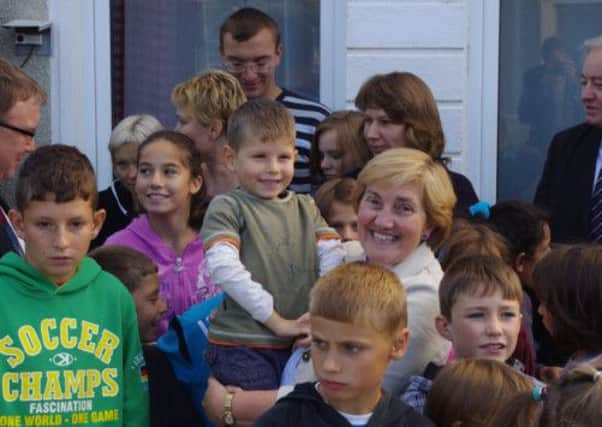Orphans witness real charity at work


THE newly arrived charity worker in the refuge goes to hug the young man he knows well. Even though it is ten years since the boy that became the man was rescued from the streets, he automatically flinches and puts up an arm to defend himself.
The charity worker seems to flinch mentally at the realisation that, despite his efforts, the boys at the Daniel Centre in Cluj, Romania can never wipe out all traces of an ugly past.
Advertisement
Hide AdAdvertisement
Hide AdBut I saw at first hand what a difference the Scottish charity Blythswood Care does make. Readers may know it as the organisation which sends shoeboxes with small gifts at Christmas, but this is just one small part of the role it plays. Blythswood Care helped Robert Man, who kept running away from the kind of grim state orphanages which stunned TV viewers in the west during the Nineties. Robert spent many of his teenage years sleeping with a dog in a garage for warmth and company. At the charity’s Daniel Centre he was among the boys nurtured and supported into adult life.
Years on they still have the ingrained habit of eating with a hand curved round their plate to ward against predators. One newly arrived boy breaks down as he tries to tell me of his life to date. Robert, now with his own flat and successful minibus business, sits at the table talking happily to the Blythswood staff, who are effectively his family.
Finlay Mackenzie, who has spent the past 21 years travelling to the Balkans from his home near Dingwall, is the constantly teasing father figure. Now Robert is a role model for all the younger boys, demonstrating just what they could become. For the members of staff, success comes when the boys realise that everyone has – to varying degrees – good and bad experiences in their past and that it is within their power to move towards a “normal” life too.
The hope is that Romanians will eventually move towards looking after their own, but after more than 40 years of Communism, there is no recent tradition of volunteering or philanthropy. Charities like Blythswood from far afield, and the churches in Romania, strive to encourage a cultural shift towards social care, while in the interim trying to fill the breach. Finger in the dyke perhaps, given the scale of poverty here however, a pointer to the future that could be, is the more positive way to look at it.
I have been moved by the Elpis Foundation in Dej, an education charity which has for example stepped in to help a 16-year old boy and 14-year-old girl trying to bring up five younger siblings in what is no more than a barn. Their parents are among officially three million – in practice many more it seems – who, in the absence of a meaningful benefits system, have gone abroad in search of an income. While an elite re-badged as capitalists may roar around in imported cars, there are many Romanians travelling the roads in carts with ponies. Grandparents bring up many children, but the Reformed Church orphanage in Oradea tries to deal with some of those abandoned by parents overseas or with new partners who reject children of a previous relationship.
The grim state orphanages no longer exist, partly because the end of Communism here in 1989 also marked the end of a ban on contraception. The dictator Nicolae Ceaucescu wanted unlimited births to advance the fatherland.
But many children still need care. Dr Arthur Sarosi largely gave up medicine when he became aware of the illiteracy and pitiful living conditions of Roma patients.
He decided to set up the Diakonia kindergarten and afterschool centre in a village outside the city of Cluj. Partly by having some Roma adults on the staff, he has managed to win the confidence of parents traditionally loath to send their children to nursery and school.
Advertisement
Hide AdAdvertisement
Hide AdIn the heart of Cluj, the Hungarian Reformed Church has managed to regain a school once taken from it by Communist leaders. The building is in obvious need of improvement but apparently not the academic standards, which help carve a future for hundreds of disadvantaged children.
In Marguita I visit another inspirational school. It is for children with special needs and run by another Blythswood partner, Fundatia Cristina Elm projects.
Adults are the focus at the Bonus Pastor project at Ozd. Here Church members offer life coaching to addicts – and to addicts’ children – a little joy in the form of summer camps in a medieval castle, which is being gradually restored with the help of volunteers from all over the world.
Our visit re-established our links with the Reformed Church, who seek to not only preach the gospel with words, but live it out in social care and concern for the most needy in depths of poverty beyond our imagination.
• The Rt Rev Lorna Hood is Moderator of the General Assembly of the Church of Scotland